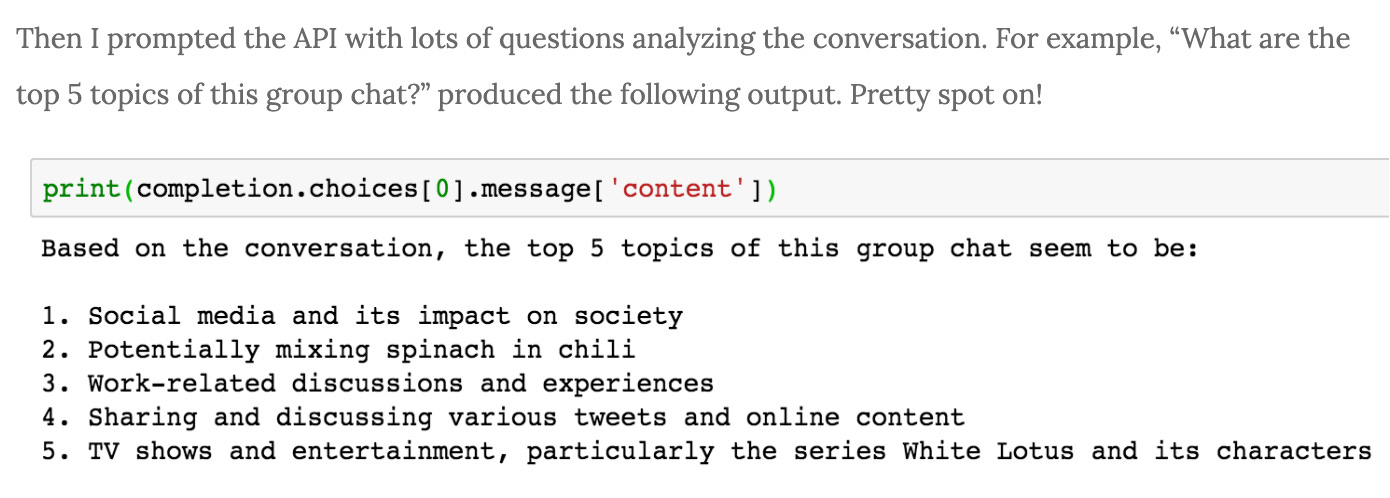Last year I wrote about analyzing my college friends’ group chat with the OpenAI API. This was the process I followed:
Exported my iMessages on my Mac to text files
Read those text files into a CSV file and cleaned them up
Fed the text messages from our groupchat into the ChatCompletion API and asked it questions
It was fun, and was a good introduction to the technology for me:
I’m revisiting this for a project now and have been struck by how trivially easy the analysis part is, and how the real bottleneck is the fact that Apple controls my iMessages and makes it hard for me to access them.
This hasn’t mattered much to me for the ten years I’ve used iMessage. But it makes analyzing my messaging data cumbersome, and it makes building something for other people to analyze their messaging data much harder.
It also puts Apple in a very powerful position, because they control so much of our most intimate data. As AI makes it much easier to extract meaning and value from this data, Apple will be able to dictate the experience and benefit from it. For example:
The Search function for iMessage is awful. I expect it will get much better as Apple integrates LLMs into iPhones. I’ll be able to ask “what was that cocktail place my friend Rohan recommended me last year?” and it will spit back a good answer. Neat, but it will lock me in deeper to the Apple ecosystem, because they own my conversations with Rohan.
There’s a huge amount of health data that phones and watches spin off and you could easily imagine iPhones becoming more powerful diagnostic devices as they can distill information from all of your biometrics and activities. “Hey, you haven’t been sleeping well or walking very much, and you’re spending more time than usual scrolling through twitter. Maybe you should reach out to a therapist.” This could both be very valuable and also further entrench Apple’s position as one of the biggest companies in the world.
In short, owning meaningful data is a source of power, and it will become a more important source of power as AI makes it easier to extract value from that data. This leads to a rich-get-richer dynamic, because many of the companies that own our data are already big.
Experiences like this make me want a more open internet, which is a promise of web3 technologies (I wrote a bit about that here).
For my use case, that could mean using a decentralized messaging protocol, where I controlled access to my data and could easily programmatically access it and analyze it. I could also build an app which other people could grant access to which could analyze their messages.
An alternative that does not involve using web3 technology is to use messaging apps with open APIs. Telegram, for example, offers an API where I could interact with my messages. Obviously the trouble with this is that having an iPhone is convenient and I don’t want to be the weirdo freak who makes everyone I meet message me on Telegram.
So, it requires big societal shifts towards open platforms, and these are hard to make happen. But it feels to me like AI makes it much easier for people to interact with and get value from their data, and so there will be more desire for platforms that are open and allow users to access and use their data in custom ways.



I went to the darkside and went android with Google Pixel 8. Connectivity with Samsung tablet and Chromebook in an instant. To have completed the loop with Apple would have required £1000+ for a pro (I've not looked into it so don't know the names). I think the flexibility of Google (my TV is android, my company runs on gmail) will enable me to interrogate my own data better.